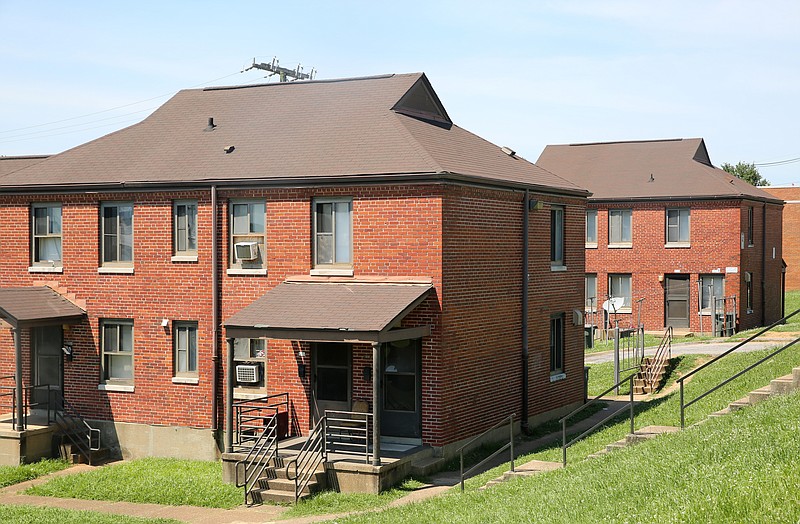When Betsy McCright joined the Chattanooga Housing Authority in 2007, the Harriett Tubman housing project in East Chattanooga was beginning to collapse after a lack of major maintenance on the 55-year-old complex for more than two decades.
"I remember one morning nine roofs fell in and we had to move out nine families," McCright recalled. "It was really beyond repair so we ended up having to take that down. Unfortunately, it ended in a very final death."
Although CHA found alternative housing for most of the displaced former Tubman residents, McCright said she is determined to avoid such a closure at any of CHA's other aging public housing projects.
At Chattanooga's oldest and biggest public housing project - College Hill Courts - CHA and other city agencies are working with local residents to re-imagine a new future for the Westside area that also includes Boynton Terrace Apartments, Gateway Towers, Dogwood Manor, Ridgeway, Golden Gateway, Boynton Overlook and Riverview Apartments.
"We're trying to plan for the future at College Hill Courts and Gateway Towers and right now those facilities are more than 90% full and we have a waiting list of people wanting to get in there," McCright said. "These facilities need repairs, but we're far enough out that we can go through extensive planning for the future and still preserve units for people with low income while we start building the new units."
The 497-unit College Hill Courts was originally built in 1940 and CHA estimates that bringing the facility up to today's Housing and Urban Development standards in its current design would cost $63.2 million. McCright said up to $94 million is needed to make all of the needed repairs along with other supportive infrastructure in the community.
The 132-unit Gateway Towers is newer, having been built in 1977, but it also is in need of repairs, McCright said.
But rather than simply repair the current facilities, the city housing authority last year launched a 9-month study to re-imagine the 120-acre area that is home to nearly 2,000 residents along with the city's Youth and Family Development Center and a handful of other properties, including the former James A. Henry elementary school, the Renaissance Presbyterian Church and a handful of businesses.
CHA has employed EJP Consulting Group in Florida and the Urban Design Studio in Chattanooga to gather ideas from the community about how to redevelop the area to maintain or increase the number of affordable housing units while adding more market rate housing, business services and recreation for local residents. Since Septembers, 497 residents have filled out surveys or talked with planners of the "Westside Evolves" study to offer their ideas and input.
Rhae Parkes of EJP Consulting Group said residents want to preserve some of the historical markers in the area but improve the quality of the housing, the safety of the community and the connectivity with the nearby Tennessee River and downtown Chattanooga.
Implementing a new plan for the area is likely to take a decade or more to complete, Parkes said. But she said the area has a rich potential given its location, history and support from the city.
A majority of residents in the Westside said a grocery store or supermarket is "very needed" in the area and a majority supported adding a laundry and dry cleaner along with a health center.
Nearly four years ago, CHI Memorial closed its Westside Health Center that was housed in the former James A. Henry elementary school, which was built in 1937 and remains a community gathering place.
In the next month or two from the residents' surveys, planners hope to unveil a new plan for the area for residents and city officials to consider.
Even though a new and potentially denser development may be proposed, McCright and city officials said they are committed to maintaining or even increasing the 629 rental units for low-income families at College Hill Courts and the nearby Gateway Towers. They also want to use the CHA and city property for other housing and development and to better connect the public housing facilities with developments being made all round it, including The Bend on the former Alstom property, nearby downtown businesses and Cameron Harbor which has attracted more than $150 million of new housing in the past decade.
With the promised city and CHA property and other support, Chattanooga could qualify for up to $35 million of grants from HUD's Choice Neighborhood Initiative which tries to leverage public and private dollars to support locally driven strategies that address struggling neighborhoods with distressed public housing. Tennessee's Low Income Tax Credit program also could make funds available for other types of affordable housing in the area and study planners said they will soon meet with local foundation heads about philanthropic support for revitalizing the area.
Still more money could be available for developing affordable housing if Congress approves President Biden's sweeping infrastructure program, which allocates $213 billion for housing projects including $40 billion more for public housing.
"We're excited by the level of community interest and civic engagement in this process, and are looking forward to seeing a proposed plan for the city to review," said Ellis Smith, a spokesman for Chattanooga's new mayor, Tim Kelly.
Contact Dave Flessner at dflessner@timesfreepress.com or at 423-757-6340.
